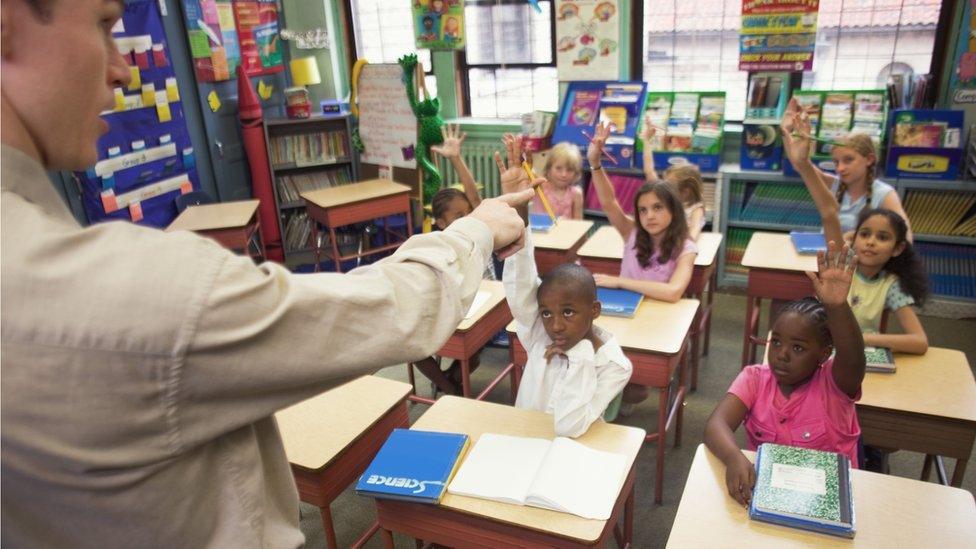John Swinney: Schools review to 'empower' teachers
- Published
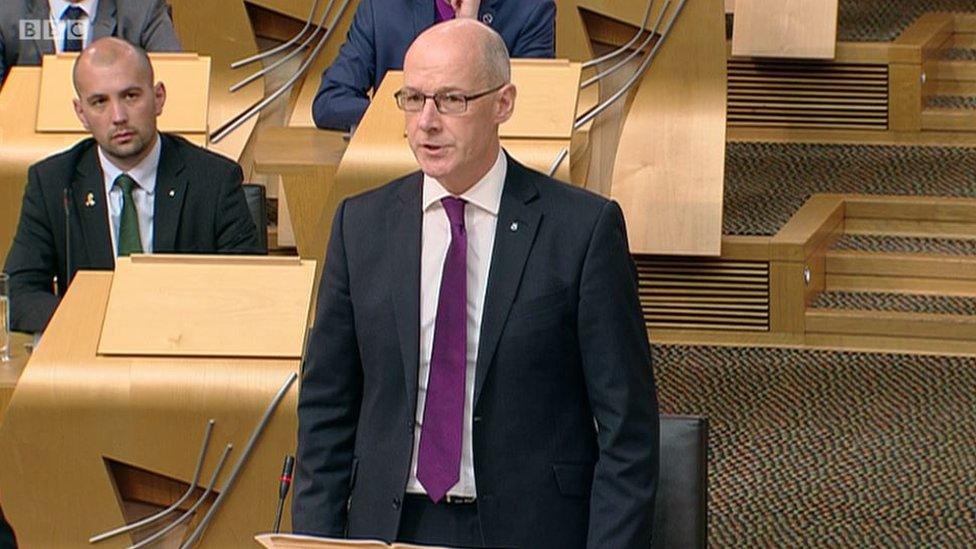
Education Secretary John Swinney announced the review to the Scottish Parliament
Teachers will be "empowered" to take the best decisions for their pupils in a major review of how schools are run in Scotland, John Swinney has said.
The education secretary has launched a consultation on the governance arrangements for schools, which could give them substantial new powers.
Mr Swinney said councils would remain democratically accountable for schools.
But he said the government's aim would be to give schools and head teachers as much power as possible.
Mr Swinney also outlined plans to create regional education boards to encourage co-operation across council areas.
The actual details of what powers will go to schools and which ones are to remain with councils will now be discussed.

Analysis by Jamie McIvor, BBC Scotland education correspondent

The moderate language and conciliatory tone of John Swinney masks the fact that truly radical change could be coming to the way Scottish schools are governed.
To be clear, there will be no English-style academies, no grammar schools or selection on the basis of academic ability.
What may change significantly is the role of councils in the system.
In many respects, the school system is a national service which Scotland's 32 local authorities are entrusted to deliver.
The government has no intention of removing schools from council control - the question is more what powers councils may retain.
Read more here.

Some in local government have previously expressed concern about any moves which could reduce the role of councils in the system by stealth.
Announcing the review to Holyrood, Mr Swinney ruled out introducing privately-run academies, selection or grammar schools in Scotland.
He told the Scottish Parliament such a system was "divisive".
The School Governance Review will run until 6 January 2017, with the government seeking views, external from children, parents, teachers and the wider community.
In his statement to the Scottish Parliament, Mr Swinney said: "Our guiding principle for the way our schools are run is simple. Decisions should be taken at school level. That will be our presumption and we will place it at the heart of this review.
"This is a vision of empowerment and devolution. We will empower our teachers and our early years workers to make the best decisions for our young people.
"We will place them at the heart of a system that makes decisions about children's learning within the schools themselves, supported by parents and the local community."
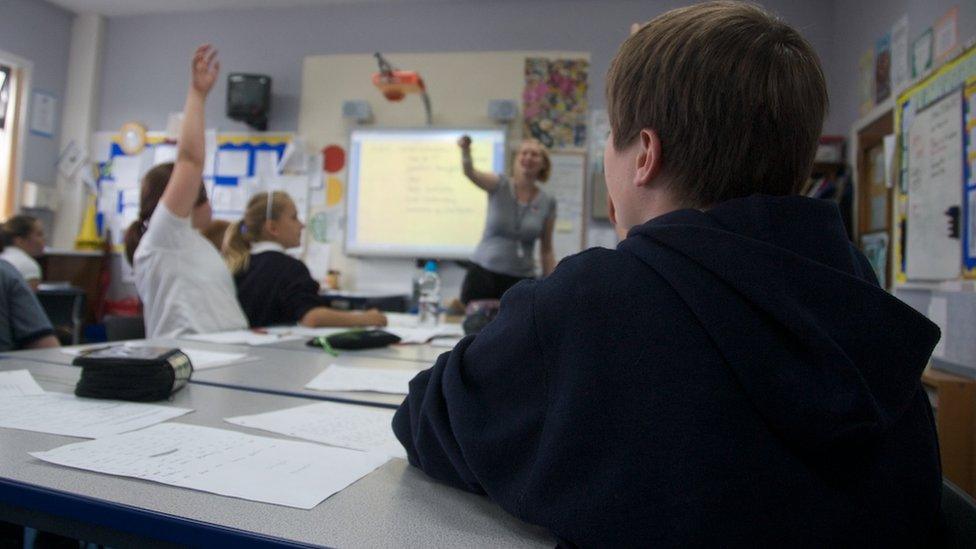
Mr Swinney said teachers would be empowered to take decisions in the best interests of children and young people
The education secretary promised that reform would be based on evidence - which he said showed that "systematic collaborative engagement" at every level was what delivered the best outcomes for children.
He added: "We will never go down the divisive academy model. And there will be no return to selection or grammar schools."
BBC Scotland's education correspondent Jamie McIvor said some in local government would be on the lookout for anything which could risk either undermining the role of councils in running schools by stealth - or add to the workload of head teachers.
Councils are fiercely protective of their role in the education system.
A row is already brewing between the government and some councils over plans to give £100m from changes to the council tax to head teachers.
Some councils fear that through the complexities of the local government funding system this money will effectively go into a national pot - undermining the direct link between council budgets and the council tax.
Free school 'disaster'
Scotland's largest teaching union, the Educational Institute of Scotland (EIS) said the review must enhance support for schools and promote local democracy.
EIS general secretary Larry Flanagan said: "The Scottish government has made clear that it does not intend to take schools out of local authority control nor does it intend to mimic the disasters of UK policy in terms of academies or free schools. That is to be welcomed.
"In Scotland, there remains a widely shared continuing commitment to the core ethos of our highly inclusive system of comprehensive education.
"At a time when the UK government seems determined to embed division - largely based around socio-economic factors - within its school system, it is important that we take a different approach here in Scotland."
Mr Flanagan said the EIS believed there was scope for greater support being provided to schools without compromising local democratic accountability.
Scottish Conservative education spokeswoman Liz Smith said: "We have been calling on the Scottish government for years to drive more control and power down to schools.
"If this is what is going to happen under this review, then that is to be welcomed.
"But as ever with this SNP government, it will need to be watched carefully to make sure it delivers on its promises."
She added: "New educational regions must not be a Trojan Horse for yet more centralisation.
"What's more, Mr Swinney should cut the evasion and simply back parents who want to save their school by opting out of local authority control."
Labour's education spokesman Iain Gray said Mr Swinney had refused to rule out "a return to the discredited Tory policy of letting schools opt out of local authority control".
Mr Gray said: "Schools opting out of local authorities would risk the gap between the richest and the rest growing.
"If Mr Swinney is serious about cutting the attainment gap then he should pledge a world-class education for every young person, rather than allow the possibility that some schools could opt out."
- Published8 September 2016
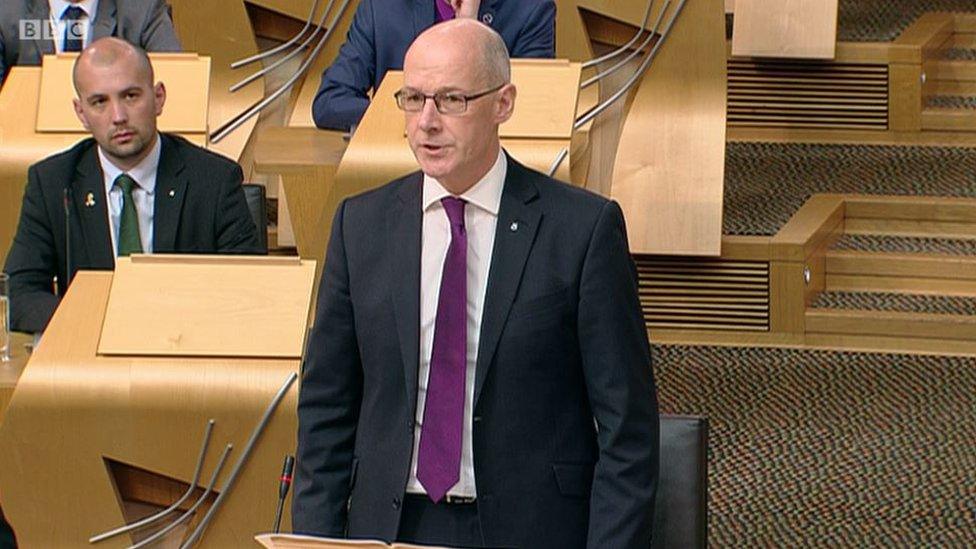
- Published15 June 2016
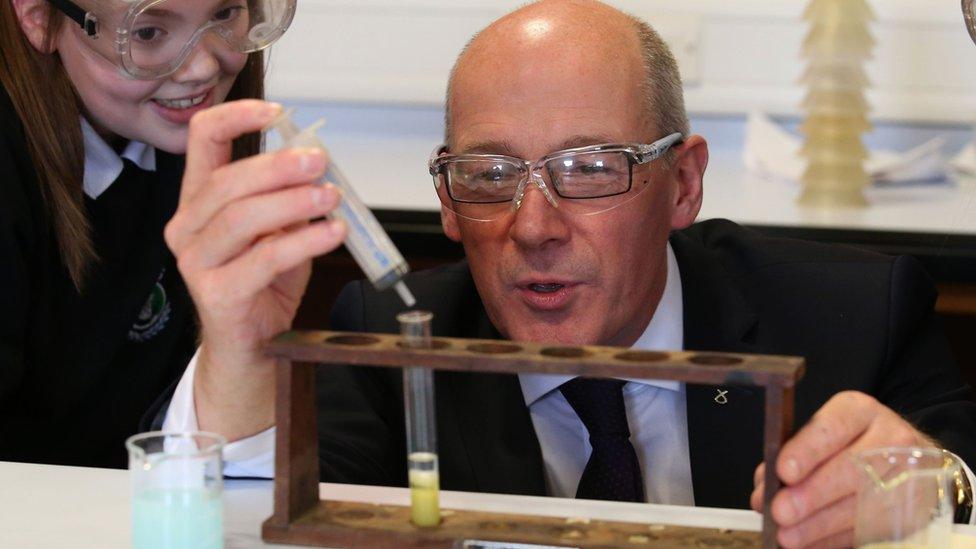
- Published11 June 2016
